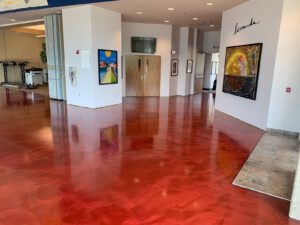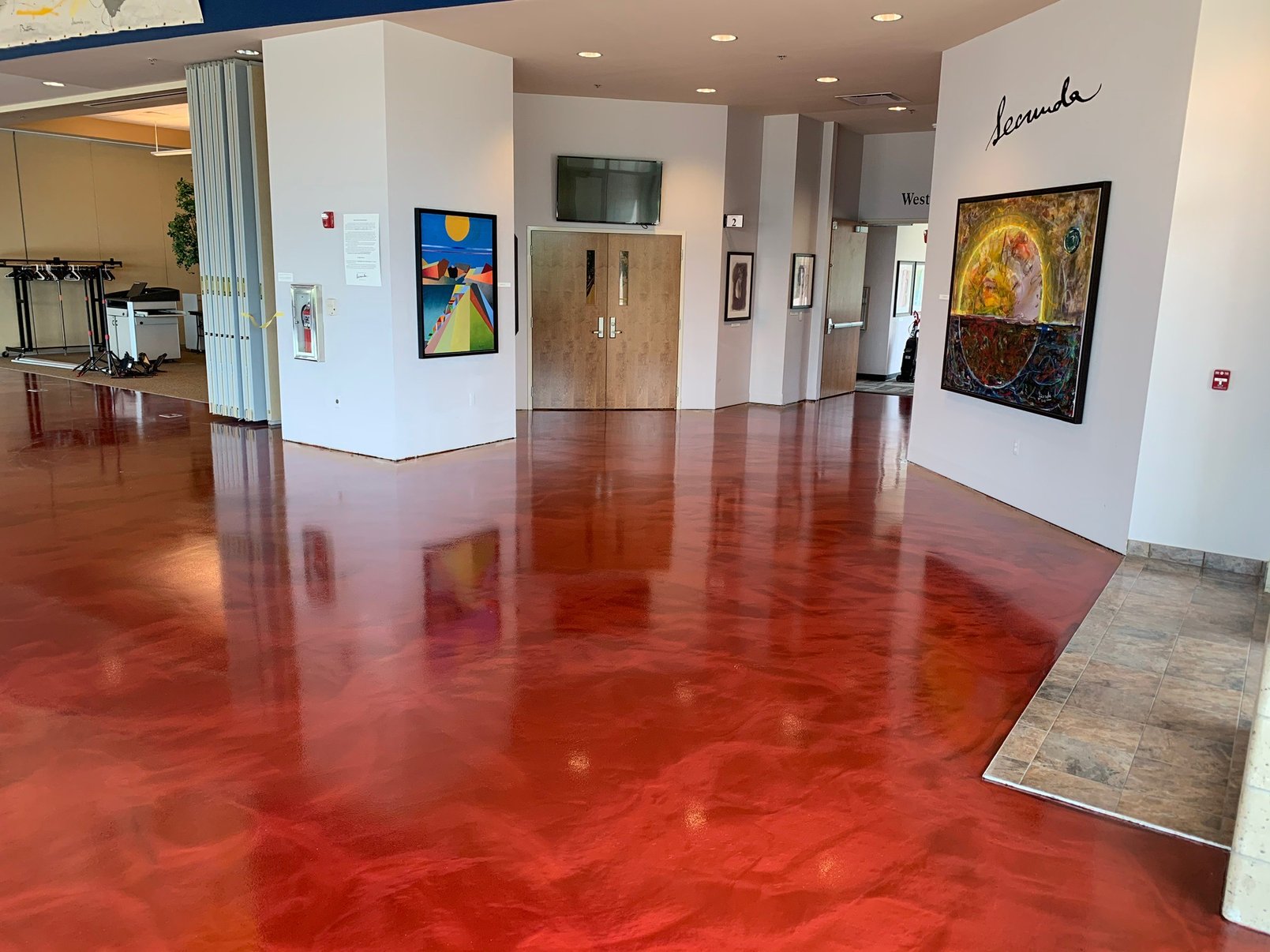Epoxy Flooring Charles Town WV offers a great look to your floor and is highly customizable. It can be sanded down and painted over for an even more unique appearance.

Safety is also a priority with epoxy floors. Anti-slip additives can be mixed in, such as polymer grit, aluminum oxide, or gravel, for added grip on the floor.
Epoxy floor coatings can be applied in a variety of colors and designs to create an aesthetic that suits your space. They can be completely clear to allow the concrete below it to shine through, tinted in standard or custom hues, or embedded with colored epoxy paint flakes or chips to add texture and color. Dye can also be added to the epoxy as it’s mixed for even more customized coloring options.
While ceramic tile is a common flooring choice for commercial and industrial spaces due to its durability and resilience, it’s limited in its ability to showcase your personal style. Epoxy floor coatings, on the other hand, are highly customizable, making them a better option for high-traffic areas that may scuff and scratch more easily than softer materials like carpeting or hardwood floors.
For example, a business lobby might benefit from a shiny metallic finish, while an office garage might be best served by a solid coating in a neutral shade that will keep things looking clean and professional. A home studio that will see heavy traffic and equipment use, on the other hand, would be a good candidate for a vibrantly colored epoxy floor that reflects the personality of the owner.
Regardless of the final look, all epoxy coatings require extensive surface preparation to ensure the strongest possible bond with the concrete underneath. This is especially important in high-traffic areas, where the pressure of wheels and feet will cause the epoxy to weaken over time if it’s not properly prepared. Unless you’re familiar with the process, it’s typically best to leave it to the professionals to avoid an expensive and frustrating DIY disaster.
It’s also important to note that some types of epoxies are not as durable as others. Water-based epoxy and cycloaliphatic epoxy, for instance, are not as hard as the polyurethane topcoats used in the most durable coatings. They are prone to yellowing, fading, and dulling over time, so it’s essential to choose an aliphatic epoxy that includes a urethane topcoat. This will not only increase the lifespan of your floor, but it’ll also make it more resistant to scuffing and other damage.
Durability
Many other flooring solutions require regular waxing or recoating, but epoxy floors can last for years and still look great. Epoxy floors can be used in a variety of settings, including commercial and residential. The durability of an epoxy floor depends on the type of epoxy flooring system installed, how well the concrete was prepared before the application, and how often the floor is cleaned and maintained. High-quality epoxy floors can last for decades, even if they are in heavily trafficked areas.
In addition to being durable, epoxy floors are also resistant to chemicals. Chemicals such as oil and brake fluid won’t damage an epoxy floor, so if you use your garage for car repair or housework, you can rest assured that your flooring will be safe from chemicals. Epoxy floors are also easy to clean, and most cleaners can be swept or mopped without damaging the surface.
If you want to add a touch of style to your epoxy floor, it can be adorned with decorative chips. These can be in a variety of colors and patterns, so you can create the perfect look for your space. These chips can add traction to the floor as well, making it safer to walk on.
Another way to make your epoxy floor more slip-resistant is to add texture. The texture can be a simple grid or a series of bumps, and it can help prevent accidents and injuries. This is particularly important in industrial environments, where an accident can be catastrophic.
Epoxy floors can also be formulated to resist moisture and other contaminants. Antistatic epoxy systems are available for high-traffic areas where static charges can build up and attract sensitive electronic equipment. They are designed to safely transfer static charge to defined earthing points, so they can be used in environments such as clean rooms and specialized food processing facilities.
If you’re looking for a durable, attractive flooring solution for your home or business, an epoxy floor is the right choice. It’s easy to clean and can withstand heavy foot traffic, so you can enjoy it for years to come.
Slip-Resistant
Epoxy flooring is a popular choice for many business locations and homes. It is extremely durable and long-lasting, and it can be easily cleaned without the need for sanding or polishing. It also offers a range of different colors, patterns, and swirls that can make it even more personalized.
One of the most important properties of epoxy is that it is slip-resistant. This can help to control, minimize, and mitigate the risk of slip, trip, and fall accidents in industrial and commercial sites or even in residential areas where there is high foot traffic.
Unlike concrete floors, epoxy is not porous and therefore does not absorb spills or water, which could make them slippery when wet. Professional installers can add anti-skid media to the top coat of an epoxy system to create a rough surface that provides positive traction and reduces the chance of slipping. There are a variety of different anti-skid materials, from the least aggressive polypropylene and glass spheres to the more aggressive aluminum oxide. Depending on the environment and level of slip resistance required, the correct product will be selected to suit the application.
The smooth surface of an epoxy floor is also hygienic, as it does not allow bacteria or pathogens to hide in nooks and crannies like some other commercial floor coatings. It is also easy to sanitize. In addition, the chemical-inert nature of epoxy means it will not react with any chemicals that may be spilled on it.
Epoxy resin is a cost-effective solution that can last up to 8 years in harsh industrial environments and 20 years in moderate office and commercial applications. It is a great alternative to carpet or tile and can be resealed as needed to prolong its lifespan.
When an epoxy floor is properly prepped and installed, it is extremely hardy and will withstand shock, heat, and stains. It can also be made more slip-resistant by adding an anti-skid aggregate, making it a safer option for those who work in harsh conditions where the risk of slip and fall is higher.
Easy Maintenance
Epoxy is a low-maintenance flooring solution that’s easy to sweep and mop. It can be used in high-traffic areas, such as a residential garage or commercial space, and still look great after years of use. Sweeping the floor daily will remove any debris and dust that may cause the surface to scratch or erode. For a deeper clean, it’s recommended to mop the epoxy flooring on a weekly basis or even more frequently in high-traffic areas. For mopping, a soft mop and mild cleaners are ideal. A cleaning solution such as one part Simple Green and eight parts hot water will be effective for most cleaning needs. For tough stains, a kitchen sponge or deck brush can be used to gently scrub the area. Avoid using steel wool or abrasive cleaners, as these can strip the epoxy’s glossy finish.
If you plan on working on vehicles in your garage, it’s a good idea to place walk-off mats at the entrance of the garage so any dirt or sand is gathered there and doesn’t end up being tracked onto the epoxy flooring. Similarly, it’s important to place mats under bikes and motorcycles to prevent them from damaging the floor surface when they’re being pushed around.
For any chemicals that are spilled, such as oil or brake fluid, it’s important to wipe them up quickly and completely to avoid a physical reaction with the epoxy. It’s also a good idea to keep a neutralizing agent in the garage so chemical solutions can be washed away before they have a chance to react with and discolor the floor surface.
Once the epoxy has been cleaned, it’s a good idea to apply wax to maintain the shine and protect the floor from scratches and other damage. It’s not necessary for every floor, but if the flooring has been exposed to harsh chemicals and excessive sunlight, it’s definitely worth considering. A reputable floor coating company will be able to recommend the best wax for your specific flooring.
